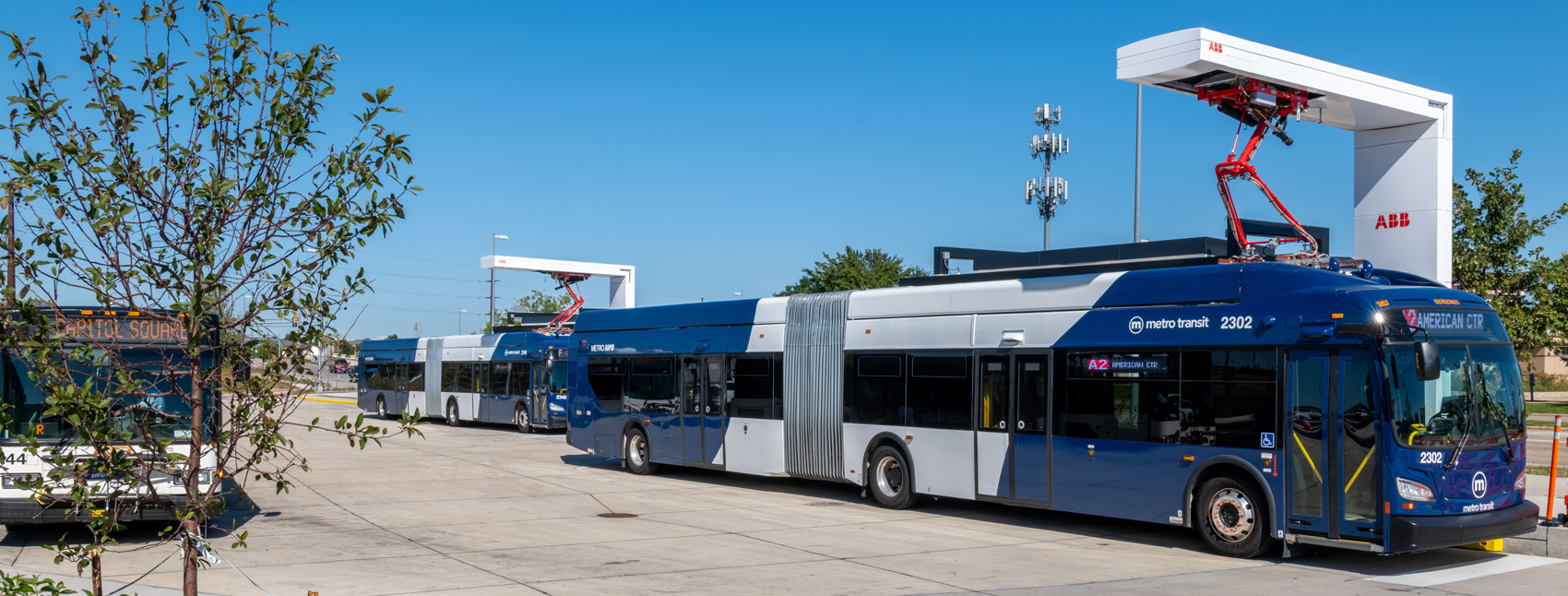
Achieving an efficient mobility future
Leveraging strategic planning, effective partnerships and public engagement, agencies are optimizing their fleets through sustainable, next-generation transit technologies
By Fiona Wu and Amanda DeGiorgi | HNTB
Driven by the opportunity to realign and optimize services for select communities, the transportation sector is exploring technologies to improve operational efficiencies.
These advancements, which include zero emissions transit solutions (ZET), can provide benefits both to operating agencies and the communities they serve. These vehicles provide quieter and cleaner operations, enhancing passenger experience and reducing urban noise pollution.
For agencies to successfully transition to cleaner transit solutions, it takes more than new technologies alone. Strategic plans tailored to an agency’s specific needs, combined with strong partnerships with stakeholders and public engagement, are crucial elements of success. By leveraging these methods, many transit agencies are effectively implementing sustainable mobility initiatives that benefit their communities.
Tailoring plans to agency needs
Each transit agency has a unique approach to adopting cleaner, more efficient transportation options, requiring tailored strategic implementation plans based on specific operational needs and available resources. Factors such as ridership, route lengths, topography and power infrastructure can influence the feasibility and efficiency of adopting these solutions. For example, the topography and climate can affect battery performance and vehicle range, while ridership levels determine the capacity and frequency of service needed. Power infrastructure considerations ensure that the necessary charging stations and grid capacity are available to support the entire fleet.
By examining factors like onsite infrastructure, maintenance capabilities and labor skill sets, agencies can identify gaps and build the necessary competencies to support sustainable transit. Ultimately, the focus should be on incremental progress and practical solutions that provide lasting benefits, rather than overpromising and underdelivering on ambitious goals.
Leveraging partnerships to drive success
Agencies are leveraging a national community of implementation partners within the industry, locally and regionally, to ensure a successful transition to emissions-free transit.
King County Metro has collaborated with local jurisdictions to align fleet electrification efforts with broader sustainability goals, share information and coordinate to resolve transportation issues. These partnerships have also been essential for King County to secure the funding and regulatory support necessary for their projects. Such collaborations foster community trust and create a unified approach toward achieving clean energy targets, making the transition smoother and more efficient.
Metropolitan Atlanta Rapid Transit Authority’s (MARTA) collaborations with local utility providers and industry innovators have been important in developing the infrastructure needed for their transition to electric buses. These utilities supported MARTA in managing electric battery charging to lower electricity costs, taking advantage of off-peak pricing and better understanding their charging behavior for improved equipment maintenance. Involving utility partners early in the planning process has simplified infrastructure development for MARTA and provided insights beyond traditional route planning.
Whether partnering with the public or private sector, these collaborations are essential for agencies to overcome challenges and identify new insights to drive their clean transit programs forward.
Harnessing public support
Communicating project goals and keeping the public informed of program updates can catalyze support for the project and ensure its long-term viability.
By holding public forums, workshops and collaborating with local organizations, agencies ensure that residents feel invested in the project. Targeted campaigns can raise awareness about the health and environmental benefits of sustainable transit, while gathering feedback from residents to incorporate their perspectives into strategic plans.
Caltrain's proactive and transparent communication about their electrification project helped attract investment and public support, ultimately driving the project to completion. Public education campaigns highlighted the transformative benefits of electrification, such as reducing greenhouse gas and diesel emissions, improving air quality and relieving traffic congestion. The groundswell of public support for this project has continued as the project has experienced increased ridership following the electric transition.
The path forward
Developing clean, efficient transportation is a complex and dynamic process. New technologies will play a crucial role in advancing sustainable mobility. Agencies will continue to explore and implement the next generation of clean technology, such as battery-electric and hydrogen fuel cell vehicles, to meet their sustainability goals. The integration of advanced charging infrastructure, regenerative braking systems and energy-efficient designs will further enhance the performance and reliability of modern transit fleets.
While embracing these innovations, agencies remain united in one priority: ensuring uninterrupted revenue service and providing reliable, safe transportation to the communities they serve. Through strategic planning, strong partnerships and consistent public involvement, transit agencies are leading the way in creating a cleaner, healthier and more sustainable world.
ABOUT THE AUTHORS

Amanda DeGiorgi
Senior Director, Zero Emissions Fleet and Facilities
HNTB Corporation
Amanda DeGiorgi is a rail and transit expert, bringing extensive experience in delivering large-scale transit infrastructure programs. DeGiorgi specializes in transit infrastructure and vehicle planning, design and operations, helping transit agencies implement innovative and efficient mobility solutions.
Contact her at [email protected].

Fiona Wu
Project Manager, Zero Emissions Implementation
HNTB Corporation
Fiona Wu, PMP is a zero-emissions implementation project manager who has been instrumental in leading mass transit electric vehicle transportation projects. Wu specializes in delivering complex transit infrastructure projects, collaborating with agencies to enhance mobility and system reliability.
Contact her at [email protected].
